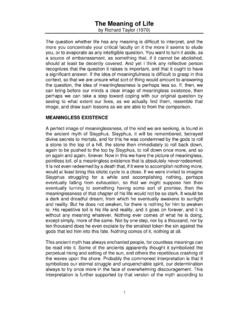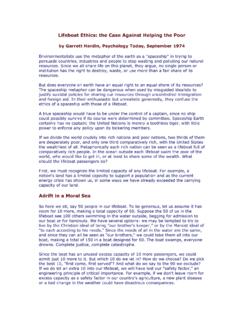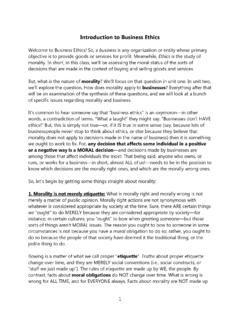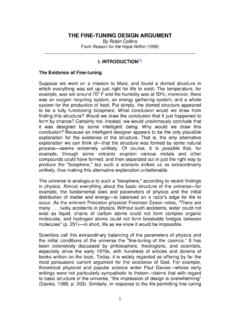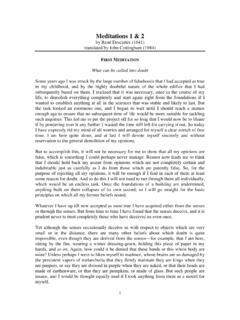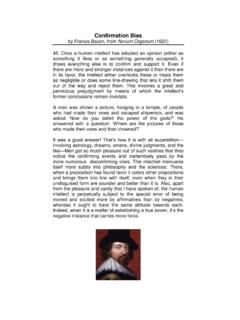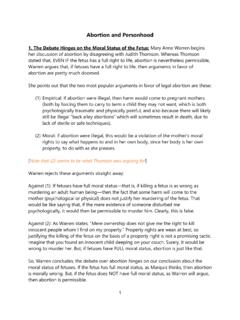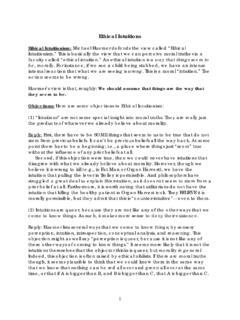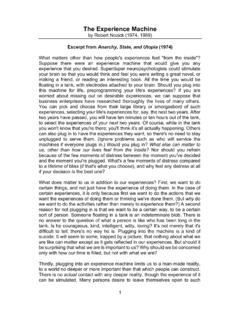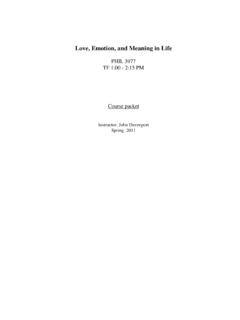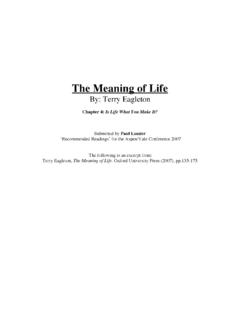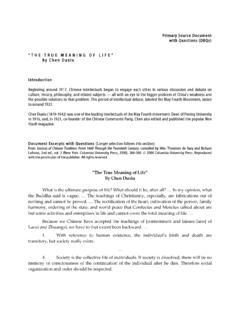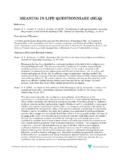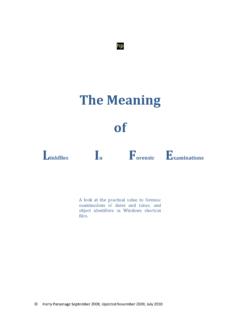Transcription of The Meanings of Lives - rintintin.colorado.edu
1 The Meanings of Lives by Susan Wolf (2007) The question, What is the meaning of life ? was once taken to be a paradigm of philosophical inquiry. Perhaps, outside of the academy, it still is. In philosophy classrooms and academic journals, however, the question has nearly disappeared, and when the question is brought up, by a na ve student, for example, or a prospective donor to the cause of a liberal arts education, it is apt to be greeted with uncomfortable embarrassment. What is so wrong with the question? One answer is that it is extremely obscure, if not downright unintelligible. It is unclear what exactly the question is supposed to be asking. Talk of meaning in other contexts does not offer ready analogies for understanding the phrase the meaning of life . When we ask the meaning of a word, for example, we want to know what the word stands for, what it represents. But life is not part of a language, or of any other sort of symbolic system.
2 It is not clear how it could stand for anything, nor to whom. We sometimes use meaning in nonlinguistic contexts: Those dots mean measles. Those footprints mean that someone was here since it rained. In these cases, talk of meaning seems to be equivalent to talk of evidence, but the contexts in which such claims are made tend to specify what hypotheses are in question within relatively fixed bounds. To ask what life means without a similarly specified context, leaves us at sea. Still, when people do ask about the meaning of life , they are evidently expressing some concern or other, and it would be disingenuous to insist that the rest of us haven t the faintest idea what that is. The question at least gestures toward a certain set of concerns with which most of us are at least somewhat familiar. Rather than dismiss a question with which many people have been passionately occupied as pure and simple nonsense, it seems more appropriate to try to interpret it and reformulate it in a way that can be more clearly and unambiguously understood.
3 Though there may well be many things going on when people ask, What is the meaning of life ? , the most central among them seems to be a search to find a purpose or a point to human existence. It is a request to find out why we are here (that is, why we exist at all), with the hope that an answer to this question will also tell us something about what we should be doing with our Lives . If understanding the question in this way, however, makes the question intelligible, it might not give reason to reopen it as a live philosophical problem. Indeed, if some of professional philosophy s discomfort with discussion of the meaning of life comes from a desire to banish ambiguity and obscurity from the field, as much comes, I think, from the thought that the question, when made clearer, has already been answered, and that the answer is depressing. Specifically, if the question of the meaning of life is to be identified with the question of the purpose of life , then the standard view, at least among professional philosophers, would seem to be that it all depends on the existence of God.
4 In other words, the going opinion seems to be that if there is a God, then there is at least a chance that there is a purpose, and so 2 a meaning to life . God may have created us for a reason, with a plan in mind. But to go any further along this branch of thinking is not in the purview of secular If, on the other hand, there is no God, then there can be no meaning , in the sense of a point or a purpose to our existence. We are simply a product of physical processes there are no reasons for our existence, just causes. At the same time that talk of life having a meaning is banished from philosophy, however, the talk of Lives being more or less meaningful seems to be on the rise. Newspapers, magazines, self-help manuals are filled with essays on how to find meaning in your life ; sermons and therapies are built on the truism that happiness is not just a matter of material comfort, or sensual pleasure, but also of a deeper kind of fulfillment.
5 Though philosophers to date have had relatively little to say about what gives meaning to individual Lives , passing references can be found throughout the literature; it is generally acknowledged as an intelligible and appropriate thing to want in one s life . Indeed, it would be crass to think otherwise. But how can individual Lives have meaning if life as a whole has none? Are those of us who suspect there is no meaning to life deluding ourselves in continuing to talk about the possibility of finding meaning in life ? (Are we being short-sighted, failing to see the implications of one part of our thought on another?) Alternatively, are these expressions mere homonyms, with no conceptual or logical connections between them? Are there simply two wholly unconnected topics here? Many of you will be relieved to hear that I do not wish to revive the question of whether there is a meaning to life . I am inclined to accept the standard view that there is no plausible interpretation of that question that offers a positive answer in the absence of a fairly specific religious metaphysics.
6 An understanding of meaningfulness in life , however, does seem to me to merit more philosophical attention than it has so far received, and I will have some things to say about it here. Here, too, I am inclined to accept the standard view or a part of the standard view viz., that meaningfulness is an intelligible feature to be sought in a life , and that it is, at least sometimes attainable but not everywhere assured. But what that feature is what we are looking for is controversial and unclear, and so the task of analyzing or interpreting that feature will take up a large portion of my remarks today. With an analysis proposed, I shall return to the question of how a positive view about the possibility of meaning in Lives can fit with a negative or agnostic view about the meaning of life . The topics are not, I think, as unconnected as might at first seem necessary for their respectively optimistic and pessimistic answers to coexist.
7 Though my discussion will offer nothing new in the way of an answer to the question of the meaning of life , therefore, it may offer a somewhat different perspective on that question s significance. 1 Thomas Nagel has what might be thought to be an even more pessimistic view viz, that even if there is a God, there is no reason God s purpose should be our purpose, no reason, therefore, to think that God s existence could give meaning , in the right sense, to our Lives . 3 Let us begin, however, with the other question, that of understanding what it is to seek meaning in life . What do we want when we want a meaningful life ? What is it that makes some Lives meaningful, others less so? If we focus on the agent s, or the subject s, perspective on a person wanting meaning in her life , her feeling the need for more meaning - we might incline toward a subjective interpretation of the feature being sought.
8 When a person self-consciously looks for something to give her life meaning , it signals a kind of unhappiness. One imagines, for example, the alienated housewife, whose life seems to her to be a series of endless chores. What she wants, it might appear, is something that she can find more subjectively rewarding. This impression is reinforced if we consider references to meaningful experiences. (The phrase might be applied, for example, to a certain kind of wedding or funeral.) The most salient feature of an event that is described is meaningful seems to be its meaning a lot to the participants. To say that a ceremony, or, for that matter, a job, is meaningful seems at the very least to include the idea that it is emotionally satisfying. An absence of meaning is usually marked by a feeling of emptiness and dissatisfaction; in contrast, a meaningful life , or meaningful part of life , is necessarily at least somewhat rewarding or fulfilling.
9 It is noteworthy, however, that meaningful experiences are not necessarily particularly happy. A trip to one s birthplace may well be meaningful; a visit to an amusement park is unlikely to be so. If we step back, however, and ask ourselves, as observers, what Lives strike us as especially meaningful, if we ask what sorts of Lives exemplify meaningfulness, subjective criteria do not seem to be in the forefront. Who comes to mind? Perhaps, Ghandi, or Albert Schweitzer, or Mother Theresa; perhaps Einstein or Jonas Salk. Cezanne, or Manet, Beethoven, Charlie Parker. Tolstoy is an interesting case to which I shall return. Alternatively, we can look to our neighbors, our colleagues, our relatives - some of whom, it seems to me, live more meaningful Lives than others. Some, indeed, of my acquaintance seem to me to live Lives that are paradigms of meaning right up there with the famous names on the earlier lists; while others (perhaps despite their modicum of fame) would score quite low on the meaningfulness scale.
10 If those in the latter category feel a lack of meaning in their Lives well, they are right to feel it, and it is a step in the right direction that they notice that there is something about their Lives that they should try to change. What is it to live a meaningful life , then? What does meaningfulness in life amount to? It may be easier to make progress by focusing on what we want to avoid. In that spirit, let me offer some paradigms, not of meaningful, but of meaningless Lives . For me, the idea of a meaningless life is most clearly and effectively embodied in the image of a person who spends day after day, or night after night, in front of a television set, drinking beer and watching situation comedies. Not that I have anything against television or beer. Still the image, understood as an image of a 4 person whose life is lived in hazy passivity, a life lived at a not unpleasant level of consciousness, but unconnected to anyone or anything, going nowhere, achieving nothing - is, I submit, as strong an image of a meaningless life as there can be.
